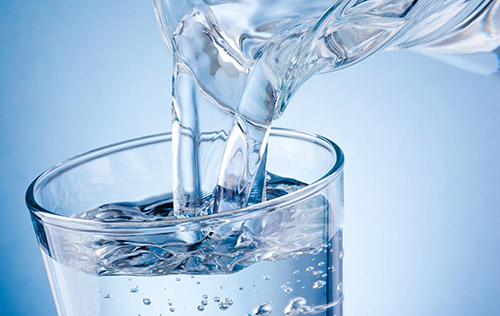Healthy Drinking Water
By Edwin Chun, D.C., CPT III, Lifestyle Nutritionist

Water is crucial to life, second only to oxygen in the body’s essential needs. You can go months without food, days without water but only minutes without oxygen.
With so many choices of drinking waters, it’s great to know about the basics of water and good health to simplify your life and create a better ripple effect to the world around you.
Unfortunately, not all water from public municipal systems are safe for drinking. Let’s not forget what happened in Flint, Michigan where dangerous lead leaked into people’s homes and many people consumed it. These days, there seems to be a level of ignorance and lack of understanding of what constitutes good healthy water.
Let’s look at some known health functions regarding water and the human body.
Known health essentials of regular water intake include:
- rehydration of cells
- oxygen transport to blood
- waste removal
- body temperature regulation
- maintaining brain function
- protecting joints and discs of the spine and the nervous system
- optimizing peak physical performance
- staving off hunger
- detoxification and improved digestion
Also, if you do not have regular healthy water intake, you will have a higher chance of dehydration related illnesses.
What is good healthy drinking water?
Remember that there are many different types of water and many of them are not ideal for drinking. For example, specialized soft water is great for bathing and cleaning but not meant for drinking.
Another example is distilled water which is almost pure H2O with no minerals meant for cooking, but not a good choice for daily drinking water.
Also, there is tap water straight out of the public water system which is fine for washing the dishes, doing the laundry and watering your plants, but not so great for bathing because of all the hard minerals and, also not ideal for drinking. Most public water systems have chlorine and fluoride meant to control bacteria and microbial life and are not ideal for drinking.
Also, waters from rivers, streams, lakes, ponds are not safe for drinking because they may contain environmental contaminants and have microbial life including bacteria, viruses, and parasites.
Let’s look at water that is safe for drinking.
HEALTHY DRINKING WATER = Safe, chemical, and contaminant-free (bacteria, microbes, virus) water meant for drinking. Water that tastes good, usually with minerals.
Good healthy drinking water is water that is without dangerous chemicals and contaminants like bacteria, virus and microbial life forms and is also water that tastes good.
In addition, it is water that tends to be rich in minerals or at least have some minerals. Minerals like trace amounts of magnesium and calcium are good and essential for the body and create a good taste for water.
The best source is natural spring water. If you happen to live in a natural area you may be able to get it free. Many water companies also offer spring water that you can purchase and have delivered to your home.
Spring water is not re-filtered water from municipal sources like you may see in many machines in front of supermarkets. Spring water is from deep within the earth and the sources are usually certified by geologists. It usually has trace amounts of important minerals your body needs like calcium, magnesium, potassium carbonate. Also, it is usually slightly alkaline.
Another good water source is purified water which is mechanically filtered water, sometimes from machines. These filters take the public water source and use reverse osmosis, carbon and remineralization, sediment filters. It is often available in supermarkets, water stores, or you can even buy your own home reverse osmosis system and have it available all the time. These filters remove chlorine and fluoride making it safer for drinking and they can add minerals back to the water.
Store bought bottled water is also good for drinking, but it may not contain many minerals and there are so many companies, that it’s hard to assess adequate filtration methods for all of them. There have been horror stories with contamination and poor filtering for bottled water especially when they are being sold at public events.
It is also terrible for the environment because of the tremendous amount of plastic waste it creates. Additionally, there is the possibility of plastic chemicals leaching into the bottled water if it sits in there for too long, and/or is exposed to high levels of UV radiation from sunlight.
There are also home water pitcher filters. These are safe for drinking because they do remove chlorine, and most industrial chemicals from the municipal water source, however fluoride is not removed with these filters so if you are trying to avoid fluoride, beware.
You can also create your own rainwater storage with a little know how. You do need to filter out the sediments, eliminate bacteria and microbes and make sure the PH is safe because rain can be too acidic.
Some people live in areas where they have their own wells. One concern with wells is environmental contamination. You can use well water as a source and then run it through a secondary filter like a pitcher to remove more contaminants before use.
There are also trendy often unproven health waters such as alkaline water systems, electrolyte waters, hydrogen waters, or functional waters infused with vitamins and flavors. Energy drinks should never be thought of for water as they are loaded with caffeine and sugar. Sports drinks also should not be consumed in large amounts or regularly with the intention of water rehydration as they are loaded with artificial ingredients.
Water that is not good drinking water = (Untreated) Tap water, rainwater, well water, water from ponds, lakes, rivers, distilled water, soft water.
Safe drinking water = Natural spring water, filtered water (using reverse osmosis, charcoal), Water filter pitchers, bottled water, water from water stores that use RO filters, additional remineralization procedures, water from bottled water services.
How much water do you need a day?
Men need about 15.5 cups (3.7 liters = 130 fluid oz), women need about 11.5 cups (2.7 liters = 95 fluid oz)*
A good general guideline is to drink 8 glasses of drinking water a day and eat plenty of fruits and vegetables.
Who needs more water? People engaging in physical exercise, endurance activities, working in hot environments, hot climates and temperatures, pregnant women and people who have illness.
Safe tips
- Foods also contribute to your water intake and especially fruits and vegetables help rehydrate your body.
- You should drink enough additional drinking water daily not to feel thirsty at any time.
- Your urine should not be bright neon yellow or have a strong smell if you are well hydrated.
- When working in the heat and/or before exercise, drink a glass of water before you go out and, also when you come back. You can also sip water during your exercise or work.
- Drinking one glass of water during a meal is advisable and does not negatively affect your digestion, but rather improves it.
- Drinking a glass of water when you start to feel hunger can help you to lose weight.
*Reference: Mayo Health Clinic
